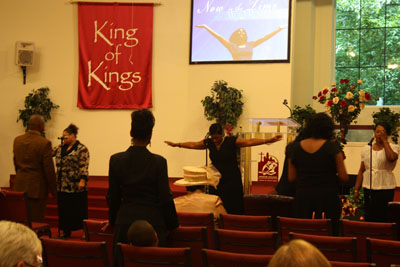
(RNS3-MAY24) Members of Kingdom Builders Church of God in Christ in Hanover, Md., worship during a Sunday morning service, where pastor Kenneth Fowlkes says “Humanists are encouraging African Americans to go to hell.” For use with RNS-BLACK-HUMANIST, transmitted May 24, 2010. RNS photo by Chika Oduah.
WASHINGTON (RNS) Standing before a room full of fellow African-Americans, Jamila Bey took a deep breath and announced she’s come out of the closet.
Her soul-bearing declaration is nearly taboo, she says.
“It’s the A-word,” said Bey, 33, feigning a whisper. “You commit social suicide as a black person when you say you’re an atheist.”
Bey and other black atheists, agnostics and secularists are struggling to openly affirm their secular viewpoints in a community that’s historically heralded as one of America’s most religious.
At the first African Americans for Humanism conference recently hosted by the non-profit Center for Inquiry, about 50 people gathered to discuss the ins and outs of navigating their dual identities as blacks and followers of the non-religious philosophy known as humanism.
“We need black non-theists to gather in one place and say, `Look at her or look at him: he looks like me and they’re atheists. And that’s OK,”‘ said Norm Allen, a former Baptist and now the executive director of African Americans for Humanism.
A 2009 study by the Pew Forum on Religion & Public Life found that African-Americans were more religious on a variety of measures than the U.S. population as a whole, with 87 percent of African-Americans describing themselves as belonging to one religious group or another.
Nearly eight in 10 African-Americans said religion is very important in their lives, compared with 56 percent of the general U.S. adult population.
“You renounce your blackness,” said Bey. “You almost denigrate your heritage and history of the people if you claim atheism.”
The 2008 American Religious Identification Survey found that those who claimed “no religion” — popularly known as the “nones” — were the only demographic group that grew in every state within the last 18 years, according to researchers at Trinity College.
Between 1990 and 2008, the number of nonreligious Americans nearly doubled, from 8 percent to 15 percent, according to the ARIS study. Among African-Americans, the increase was also nearly double, from 6 percent to 11 percent.
Howard University graduate student Mark Hatcher says African-Americans are largely invisible in a secular movement that has long been represented by white male thinkers.
Concerned that black religious skeptics were alienated on campus, he started a humanist student group this year. “It is extremely important to get these people in one room and say, `Hey, you’re not crazy,”‘ he said.
Mia Fite, a student at Johnson & Wales University in Colorado, attended the conference for that assurance. She counts herself as one of the few non-religious people among her predominantly black circle of friends.
“You expect it from white people, but it’s rare for African-American people to talk critically about religion,” she said.
Many black American humanists agree that religious principles get in the way of effectively addressing the social ills facing the black community, including a higher proportion of HIV and AIDS cases compared with other races and ethnicities.
Diane Griffin, a former lobbyist for the National Minority AIDS Council, said one of her challenges while working to pass legislation was getting black leaders to encourage condom use.
“They feel that’s gonna say that they are somehow promoting homosexuality,” she said.
Bey agreed that black churches can sometimes be part of the problem, not the solution. “We need clinics, jobs, and schools in black neighborhoods,” she said. “We need proactive solutions, and praying and churches is not the answer.”
But for so long, the church has been the only answer, says Los Angeles racial studies writer and lecturer Sikivu Hutchinson. “It’s been a source of redemption, succor, and community-building throughout African-American history,” she said.
Yet the movement is seen by some black leaders as more of a threat than an opportunity. On any given Sunday morning, the Rev. Kenneth Fowlkes’ voice rises in dramatic crescendos from his pulpit at Kingdom Builders Church of God in Christ in Hanover, Md., rousing the congregation to clap, stomp, and dance.
“Humanists are encouraging African Americans to go to hell,” he said in an interview.
Such condemnation is why many black Humanists say the journey to secularism can be a lonely one. Engineering student Duen McLean, who once thought of becoming a Southern Baptist missionary, traveled from Florida to attend the conference.
“My family, my friends, my co-workers, my identity — everything was ripped away from me when I left Christianity,” said the soft-spoken Jamaican-American.
Jonathan, a 29-year-old Washington resident who wouldn’t reveal his last name out of fear of backlash among friends and family, said his lack of religion has been nearly paralyzing.
“If I want a second date or a job in the community, I won’t say I’m an atheist,” he said. “It’s like we’re fighting for our rights all over again.”




